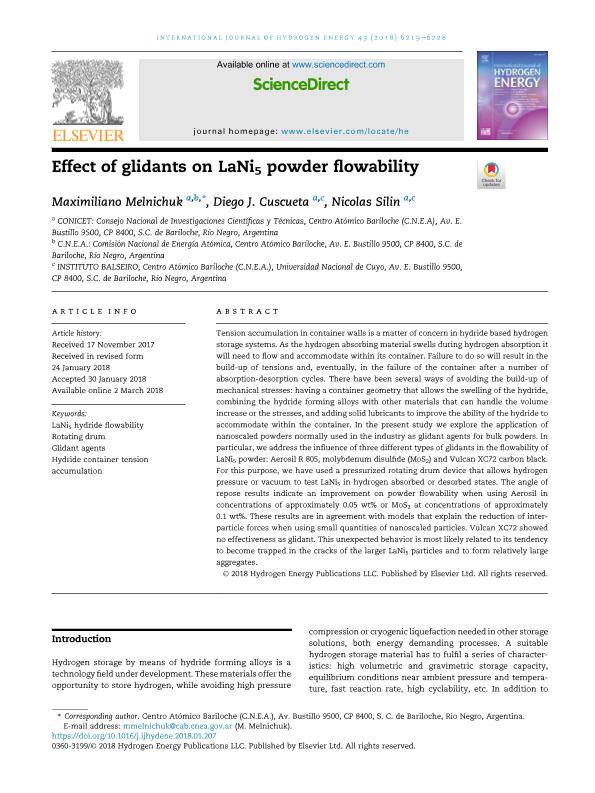Artículo
Effect of glidants on LaNi5 powder flowability
Fecha de publicación:
03/2018
Editorial:
Pergamon-Elsevier Science Ltd
Revista:
International Journal of Hydrogen Energy
ISSN:
0360-3199
Idioma:
Inglés
Tipo de recurso:
Artículo publicado
Clasificación temática:
Resumen
Tension accumulation in container walls is a matter of concern in hydride based hydrogen storage systems. As the hydrogen absorbing material swells during hydrogen absorption it will need to flow and accommodate within its container. Failure to do so will result in the build-up of tensions and, eventually, in the failure of the container after a number of absorption-desorption cycles. There have been several ways of avoiding the build-up of mechanical stresses: having a container geometry that allows the swelling of the hydride, combining the hydride forming alloys with other materials that can handle the volume increase or the stresses, and adding solid lubricants to improve the ability of the hydride to accommodate within the container. In the present study we explore the application of nanoscaled powders normally used in the industry as glidant agents for bulk powders. In particular, we address the influence of three different types of glidants in the flowability of LaNi5 powder: Aerosil R 805, molybdenum disulfide (MoS2) and Vulcan XC72 carbon black. For this purpose, we have used a pressurized rotating drum device that allows hydrogen pressure or vacuum to test LaNi5 in hydrogen absorbed or desorbed states. The angle of repose results indicate an improvement on powder flowability when using Aerosil in concentrations of approximately 0.05 wt% or MoS2 at concentrations of approximately 0.1 wt%. These results are in agreement with models that explain the reduction of interparticle forces when using small quantities of nanoscaled particles. Vulcan XC72 showed no effectiveness as glidant. This unexpected behavior is most likely related to its tendency to become trapped in the cracks of the larger LaNi5 particles and to form relatively large aggregates.
Archivos asociados
Licencia
Identificadores
Colecciones
Articulos(CCT - PATAGONIA NORTE)
Articulos de CTRO.CIENTIFICO TECNOL.CONICET - PATAGONIA NORTE
Articulos de CTRO.CIENTIFICO TECNOL.CONICET - PATAGONIA NORTE
Citación
Melnichuk, Maximiliano; Cuscueta, Diego Javier; Silin, Nicolas; Effect of glidants on LaNi5 powder flowability; Pergamon-Elsevier Science Ltd; International Journal of Hydrogen Energy; 43; 12; 3-2018; 6219-6228
Compartir
Altmétricas




